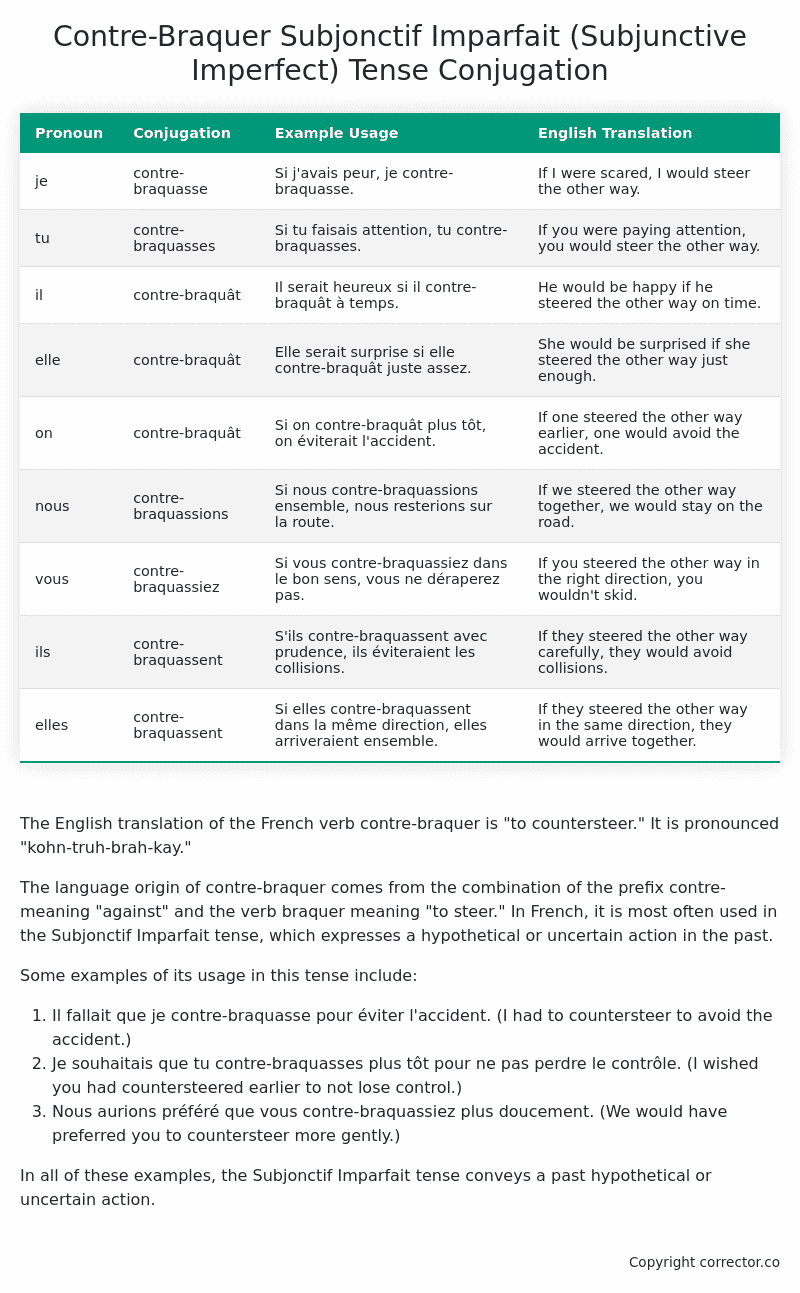Subjonctif Imparfait (Subjunctive Imperfect) Tense Conjugation of the French Verb contre-braquer
Introduction to the verb contre-braquer
The English translation of the French verb contre-braquer is “to countersteer.” It is pronounced “kohn-truh-brah-kay.”
The language origin of contre-braquer comes from the combination of the prefix contre- meaning “against” and the verb braquer meaning “to steer.” In French, it is most often used in the Subjonctif Imparfait tense, which expresses a hypothetical or uncertain action in the past.
Some examples of its usage in this tense include:
- Il fallait que je contre-braquasse pour éviter l’accident. (I had to countersteer to avoid the accident.)
- Je souhaitais que tu contre-braquasses plus tôt pour ne pas perdre le contrôle. (I wished you had countersteered earlier to not lose control.)
- Nous aurions préféré que vous contre-braquassiez plus doucement. (We would have preferred you to countersteer more gently.)
In all of these examples, the Subjonctif Imparfait tense conveys a past hypothetical or uncertain action.
Table of the Subjonctif Imparfait (Subjunctive Imperfect) Tense Conjugation of contre-braquer
| Pronoun | Conjugation | Example Usage | English Translation |
|---|---|---|---|
| je | contre-braquasse | Si j’avais peur, je contre-braquasse. | If I were scared, I would steer the other way. |
| tu | contre-braquasses | Si tu faisais attention, tu contre-braquasses. | If you were paying attention, you would steer the other way. |
| il | contre-braquât | Il serait heureux si il contre-braquât à temps. | He would be happy if he steered the other way on time. |
| elle | contre-braquât | Elle serait surprise si elle contre-braquât juste assez. | She would be surprised if she steered the other way just enough. |
| on | contre-braquât | Si on contre-braquât plus tôt, on éviterait l’accident. | If one steered the other way earlier, one would avoid the accident. |
| nous | contre-braquassions | Si nous contre-braquassions ensemble, nous resterions sur la route. | If we steered the other way together, we would stay on the road. |
| vous | contre-braquassiez | Si vous contre-braquassiez dans le bon sens, vous ne déraperez pas. | If you steered the other way in the right direction, you wouldn’t skid. |
| ils | contre-braquassent | S’ils contre-braquassent avec prudence, ils éviteraient les collisions. | If they steered the other way carefully, they would avoid collisions. |
| elles | contre-braquassent | Si elles contre-braquassent dans la même direction, elles arriveraient ensemble. | If they steered the other way in the same direction, they would arrive together. |
Other Conjugations for Contre-Braquer.
Le Present (Present Tense) Conjugation of the French Verb contre-braquer
Imparfait (Imperfect) Tense Conjugation of the French Verb contre-braquer
Passé Simple (Simple Past) Tense Conjugation of the French Verb contre-braquer
Passé Composé (Present Perfect) Tense Conjugation of the French Verb contre-braquer
Futur Simple (Simple Future) Tense Conjugation of the French Verb contre-braquer
Futur Proche (Near Future) Tense Conjugation of the French Verb contre-braquer
Plus-que-parfait (Pluperfect) Tense Conjugation of the French Verb contre-braquer
Passé Antérieur (Past Anterior) Tense Conjugation of the French Verb contre-braquer
Futur Antérieur (Future Anterior) Tense Conjugation of the French Verb contre-braquer
Subjonctif Présent (Subjunctive Present) Tense Conjugation of the French Verb contre-braquer
Subjonctif Passé (Subjunctive Past) Tense Conjugation of the French Verb contre-braquer
Subjonctif Imparfait (Subjunctive Imperfect) Tense Conjugation of the French Verb contre-braquer (this article)
Conditionnel Présent (Conditional Present) Tense Conjugation of the French Verb contre-braquer
Conditionnel Passé (Conditional Past) Tense Conjugation of the French Verb contre-braquer
L’impératif Présent (Imperative Present) Tense Conjugation of the French Verb contre-braquer
L’infinitif Présent (Infinitive Present) Tense Conjugation of the French Verb contre-braquer
Struggling with French verbs or the language in general? Why not use our free French Grammar Checker – no registration required!
Get a FREE Download Study Sheet of this Conjugation 🔥
Simply right click the image below, click “save image” and get your free reference for the contre-braquer Subjonctif Imparfait tense conjugation!

Contre-Braquer – About the French Subjonctif Imparfait (Subjunctive Imperfect) Tense
Formation
Common Everyday Usage Patterns
Interactions with Other Tenses
Subjonctif Présent
Indicatif Passé Composé
Conditional
Conditional Perfect
Summary
I hope you enjoyed this article on the verb contre-braquer. Still in a learning mood? Check out another TOTALLY random French verb conjugation!


